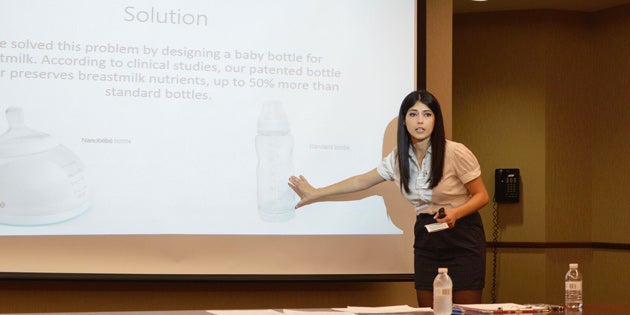
School of Business student Ani Meloyan makes a simulated pitch to investors. Photo courtesy of Mark Swick.
Ani Meloyan stands at the helm of a full boardroom in Roper St. Francis’ hospital, poised and prepared to pitch a business idea to potential investors. The faces staring back at her belong to Roper Hospital’s CEO, its vice president of medical affairs, physicians, local business owners, entrepreneurs and inventors, all of whom have come ready to either opt in, negotiate, or leave Meloyan’s business plan in the dust.
Only, Meloyan is not actually seeking money, and the bigwigs in the room don’t really intend to spend any.
This simulation played out during the spring 2016 semester as College of Charleston School of Business students Meloyan, Samantha Curtin and Michael Stalcup participated in an internship program that connected them with Israeli startup companies. As part of the internship, these three students learned more about international trade, how to write export plans, and ultimately pitched their plans to local “investors” who would potentially have a vested interest in the product.
The internship program, called “Doing Business with Israel,” is a joint initiative between the Clinical Biotechnology Research Institute (CBRI) at Roper St. Francis, the College of Charleston’s School of Business and the Yaschik/Arnold Jewish Studies Program. The program connects students with international business partnerships – specifically Israeli startups in the life sciences industry.
This Shark Tank-style scenario in the hospital boardroom was arranged as a part of the internship program’s final business plan presentation. Leading up to this day, the students were each paired with an Israeli businesses, working with their respective CEOs to learn about the products they hope to launch in the U.S.
Meloyan was connected with a business that invented a special kind of baby bottle that preserves 50 percent more nutrients of breast milk than standard bottles. Curtin’s assigned company developed smart sensor epidural needles, ensuring a more accurate needle placement. And Stalcup worked with a business that created a blood-based diagnostic test to detect Alzheimer’s disease in its earliest phase.
The interns spent two months producing business plans with the guidance of Rene Mueller, professor of marketing and director of the School of Business’ International Business Program, and the final month comparing their business plans with those of the actual Israeli businesses. Throughout the span of the project, the students also worked alongside Dr. Jacobo Mintzer, executive director of the CBRI, who offered insight into the medical component of the program.
“I was drawn to this internship due to its competitive nature and the international aspect of it,” says Meloyan. “The opportunity reinforced my decision to major in international business and served as a great opportunity to gain valuable industry experience.”
Curtin adds: “The premise of ‘transforming an idea into a product’ caught my attention. While the work was daunting and, at times, exhausting, I can say for the first time in my professional career that I was truly inspired as a result of this internship.”
U.S.-Israel Partnership
The international component is an integral part of this internship program. But, why Israel, specifically?
Mintzer, who spearheaded the initiative, completed his medical internship and five-year residency at the Hadassah-Hebrew University School of Medicine in Jerusalem, and is keenly aware of Israel’s booming healthcare industry.

Mike Auerbach, dean of the School of Sciences and Mathematics (left), and Martin Perlmutter, director of Jewish Studies, listen to students pitch their products. Photo courtesy of Mark Swick.
According to the 2015 Israel Advanced Technology Industries Report on Israel’s Life Sciences Industry, more than 1,300 active companies in the life sciences industry – comprising medical devices, biotechnology/pharmaceutical and healthcare IT/digital health businesses – operate in Israel today. In the past decade, Israel’s life sciences industry has seen an annual growth rate of 20 percent.
The only problem with this growth is its inability to flourish domestically due to Israel’s small market. Because of this, Israeli entrepreneurs tend to turn to the U.S. as their primary market. Mintzer observed the success of these U.S.-Israel partnerships, along with the Israeli model of aggressively merging business and academics, and thought of it as an incredible learning opportunity for local business students.
That is when he contacted Mueller at the School of Business and Martin Perlmutter, director of Jewish Studies at the College, to initiate the “Doing Business with Israel” internship program. The School of Business’s “ready-to-work” tools and resources, coupled with Jewish Studies’s strong interest in connecting with Israel given the strength of Israeli business today, made for a no-brainer partnership in Mintzer’s mind.
“CBRI’s connecting to Jewish Studies and the School of Business, enriching the educational opportunities for the College’s students, and exposing them to the rich fabric of Israeli business innovation is an all-around winner,” says Perlmutter. “The fact that it is a long-term initiative, with a bright future, makes it even sweeter.”
To learn more about the “Doing Business with Israel” internship program, please contact Mark Swick, community liaison for the Yaschik/Arnold Jewish Studies Program, at [email protected].






